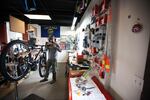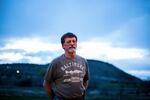
“We’ve noticed an increase in traffic," says Mike Domeyer who co-owns Shasta Leatherworks with his wife Melanie Marlow. "I think it’s definitely a plus.” Their new costumers are buying women’s hand bags and western apparel. But also luggage and brief cases. “Mostly kind of executive type products,” he says.
John Rosman / OPB
REPRESENTED
Think Out Loud is traveling to cities and towns across the state to hear about the policy issues that matter to Oregonians. How do the decisions of lawmakers in Salem affect our lives? See our full coverage here.
The idea of cloud computing is only a few years old, but like many new trends in technology, it has taken off quickly. Many of us store data online to download whenever and wherever we want it. But the cloud isn't really a cloud, of course. Much of that information is actually stored in large buildings located in small towns like Prineville, in Central Oregon.
That tech presence is having an effect on the character of Prineville. These days, you might be seated between a cowboy and Facebook executive at a diner like Dad's Place on Main Street.
Both Facebook and Apple have built data centers in Prineville (population 9,253) in the last few years, but city administrators say they'd like to see a few more. The economy of the area has been particularly depressed after Les Schwab, which was headquartered in town, moved to Bend in 2008 — and after the roof collapsed last fall at Woodgrain Millwork, one of the largest employers in town. The data centers, however, only employ several hundred people each.

Facebook opened its first data center in Prineville in 2010. The company currently has plans for a third. The town also hosts an Apple facility, and officials say they'd like to see two more data centers in the area.
Sage Van Wing / OPB
Rep. Mike McLane (R-Prineville) points to an economic impact study which found that every 10 jobs at the Facebook data center support 14 jobs elsewhere in Oregon. McLane helped to pass a bill that will change the taxation structure for data centers, and the companies that run them. HB 611 exempts most data centers from the central assessment tax. That's a tax levied by the state on communications companies based on the value of their intangible assets, like their brand identity. McLane estimates that if Facebook paid a central assessment tax, it would be worth well more than the value of their facility in Prineville. HB 611 was signed into law on Thursday, April 2.
“If it hadn't passed," said Prineville Mayor Betty Roppe, "we would have lost them. I'm sure of it.”
Prinveville Mayor Betty Roppe said companies locate their data centers in Central Oregon because of the cool nights and the plentiful electricity, "but they don't have to be here."
Apple has had plans to build a second data center building in Prineville and a solar farm to power it, but those plans were put on hold, Roppe said, because "they wanted to see what would happen with (HB 611)." Crook County Judge Mike McCabe confirmed to OPB that since the bill was signed, Apple has committed to "a major expansion."

Both Facebook and Apple built their data centers in Prineville's business enterprise zone. That means they pay taxes on their property, but not on the value of improvements for the first 15 years. The details of enterprise zone contracts remain largely secret.
Sage Van Wing / OPB
Apple and Facebook do pay property taxes on the land they have purchased, but because they are located in a city enterprise zone, the companies are not taxed on improvements for the first 15 years. Some residents worry they may be getting taken advantage of. Prineville-area resident Gayle Casselman said the companies aren't paying enough in taxes, and she worries about how much water the facilities use.
"I think that they give us just enough crumbs to distract people," Casselman said.
Facebook regional director Ken Patchett said their facility is working hard to conserve both water and electricity: "We use less water in this data center than the laundromat down the street." Both Apple and Facebook have earned praise from Greenpeace for their efforts to use more renewable energy, but Prineville itself actually earns more money, the more electricity the companies buy. Every power user in town pays a franchise fee to the power company which is distributed to the town. Roppe said the data centers have increased the town's franchise fees drastically.
"In 2009, before the data centers, we were reaping about $340,964 a year. Last year we collected $1,216,147. So obviously," Mayor Roppe said, "we're using a lot more electricity."

Facebook says the facility is one of the most energy efficient data centers in the world. Still, the building uses as much energy as all of the other homes and businesses in Crook County combined.
Sage Van Wing / OPB
Barbara Fontaine is a resident of nearby Powell Butte, also in Crook County. She points out that while Facebook and Apple do make grants to local non-profits, they could afford to give a lot more. "We get this paltry $100,000 a year that you compete for grants," she said , "I'm expecting that our communities can stand up to them and demand more and better."
Representative McLane said having data centers in Oregon is better than not having them here at all. In the negotiations on HB 611 he said, "those companies did not get all they wanted ... Nobody gets all they wanted. I didn't want our mills to shut down ... but the reality is we have an opportunity."











